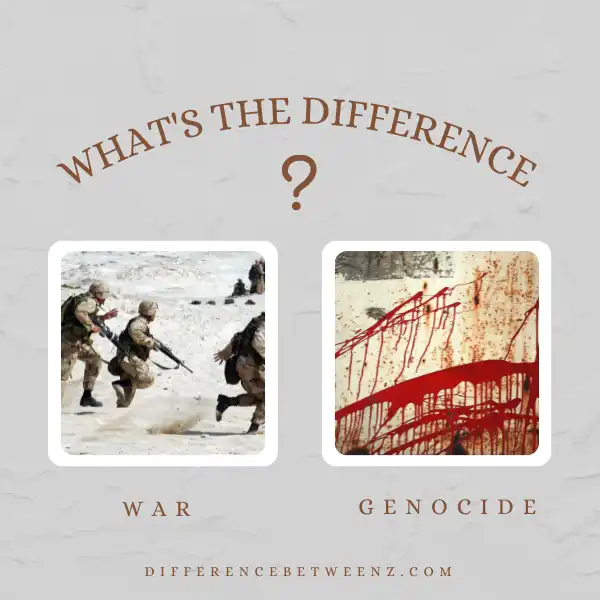War and genocide are often thought of as the same thing, but they are actually quite different. War is fought between armies of two or more countries, while genocide is the intentional killing of a certain group of people. While war may lead to genocide, it is not the same thing.
What is War?
War is a state of armed conflict between different nations or states or different groups within a nation or state. It is generally characterized by extreme violence, aggression, destruction, and mortality, using regular or irregular military forces.
- An absence of war is usually called “peace”. War can occur as a result of interstate, intrastate, and non-state conflict. War should be understood as an actual, intended and structural causality manifested in violent behavior.
- The Cambridge Online Dictionary defines war as “a situation in which countries or groups of people fight each other”. There are varying scholarly definitions of war, which will likely reflect the biases of the definer.
- Noel Malcolm provides one commonly cited definition in his book Aspects of European History 1494–1789: “War is a state in which a nation undergoes large-scale collective violence for the purpose of conquest, annexation or change in government.” Other scholars stress the importance of accepting multiple definitions given the complexity and prevalence of warfare in different human societies.
What is Genocide?
Genocide is the deliberate and systematic destruction of a racial, ethnic, religious, or national group. The term was coined in 1944 by Raphael Lemkin, a Polish-Jewish lawyer who fled the Nazi invasion of his country. Lemkin defined genocide as “the destruction of a nation or an ethnic group.”
- However, the United Nations Convention on the Prevention and Punishment of the Crime of Genocide defines it more broadly as “any of the following acts committed with intent to destroy, in whole or in part, a national, ethnic, racial or religious group.”
- These acts can include killing members of the group; causing serious bodily or mental harm to members of the group; deliberately inflicting conditions on the group that is calculated to bring about its physical destruction in whole or in part; imposing restrictions on births within the group; and forcibly transferring children of the group to another group.
- Genocide is a crime under international law, and those who commit it can be prosecuted by any state that has ratified the Genocide Convention. The first person to be convicted of genocide was Adolf Eichmann, a Nazi official who played a key role in organizing the Holocaust. He was found guilty by an Israeli court in 1962 and executed two years later.
Difference between War and Genocide
Wars and genocides are both tragic events that result in death and destruction. However, there are some important differences between the two. Wars are typically fought between two or more groups, with each side trying to gain control over territory or resources. In contrast, genocides are often motivated by a desire to eliminate an entire group of people, often based on their ethnic or religious identity.
This difference is reflected in the scale of the violence. Wars often involve large-scale battles between opposing armies, while genocides typically involve smaller-scale violence targeting civilians. As a result, genocides often result in higher levels of death and destruction than wars.
Conclusion
The difference between genocide and war is vast. Genocide is the systematic extermination of a particular group of people, while war can be defined as armed conflict between two or more groups. The UN Convention on the Prevention and Punishment of the Crime of Genocide defines genocide as any act committed with the intent to destroy, in whole or in part, a national, ethnical, racial, or religious group.
It’s important to remember that genocide doesn’t only refer to mass killings – it also includes deliberate measures meant to prevent births within a certain group, forcible transfer of children from one group to another, and the intentional imposition of conditions that will lead to physical or mental destruction.


